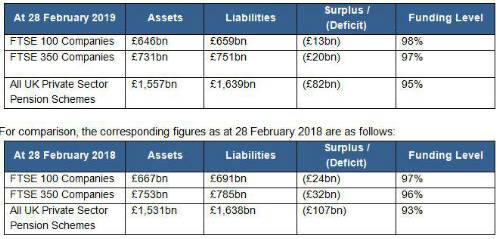
Charles Cowling, Chief Actuary, JLT Employee Benefits, comments: “Despite the continued political turmoil in Westminster and across the EU, the last month has seen little change to the aggregate position for FTSE 100 pension schemes which continues to show a modest overall deficit. Recent inflation figures have been positive and markets are holding up despite the increasing uncertainty and proximity of a potential Brexit endgame. Markets traditionally do not like uncertainty and there is clearly a strong desire from businesses for certainty on the Brexit outcome to be managed, whatever that may be.
“Whatever the outcome of Brexit, the outlook for pension scheme deficits suggests a high risk of more volatility and potentially higher pension deficits. This has been exacerbated by statements from the Bank of England which warned that not only would a no-deal Brexit likely result in higher inflation, as a result of weakening sterling and higher tariffs for the UK on global trade, but also that it would likely respond by lowering interest rates. Indeed, the Bank of England has said that with the uncertainty around Brexit, the next move in interest rates could be in either direction – seemingly with equal likelihood. This could be bad news for pension schemes – many of which are effectively gambling on markets and, in particular, interest rate rises to bail them out of uncomfortable deficit positions.
“While many pension schemes have successfully navigated recent turbulent markets by taking out investment risk, many are still heavily exposed either to a fall in interest rates or a rise in inflation, or both. Trustees and companies should urgently look at their hedging strategies on interest rates and inflation and check whether increases to the level of protection are now appropriate. Trustees would not gamble pension scheme money on black or red in a game of roulette – I’m not sure that gambling on the next direction for interest rates is any better.”
|

